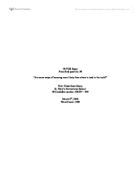LANGUAGE: FOR
Well, we can see that you have utilized language as your evidence; and it is said to be a reliable source, since ‘the invention of written language has added a new dimension to linguistic behavior.’ And furthermore, it has proved its function effectively in this case of acting as a means of communication at a distance through time and space. The evidence that you have put forward, vividly states that, according to Plato, Atlantis was true.
But, there could be some trouble with this particular vehicle of knowledge; this being the etymological fallacy, that bring to light the failure to understand the evolutionary nature of language, especially fitting in this case, since the evidence has been translated from one script that was written almost 11,000 yrs ago to another. Thus, sometimes words that would have had a particular meaning previously could have evolved to something different today. Also, with the difference in languages, it could be difficult to translate sentences exactly, due to which the encoded thought that Plato wanted to communicate, may have been misleading.
Furthermore, since this was written almost 11,000 years ago, it is said that in ancient times, some words were forbidden or not allowed to be uttered or written, due to which, circumlocutions were utilized, this highlights the use of indirect forms of expression, which once again, is misleading for the reader.
Also, Plato’s bias is profoundly applicable, since, “We tend to see, what other people see or say that they see.” Therefore, with convincing language, he could have encouraged you to believe the existence of Atlantis.
AGAINST:
Keeping in mind the evidence that you have provided to prove that Atlantis is actually a myth, it has had me quite convinced, but I noticed that, your belief against the existence of Atlantis is very strong, that elevates the possibility, that your sensory perception maybe affected. I mean to say that, what we perceive does not only depend on physical, chemical or biological factors, but also on our beliefs and expectations. Therefore, “You may tend to perceive what you expect to perceive.” Or “You may tend to see what you want to see.” So, even if there is a proof that goes against your belief, you would look at it in a negative light, in order to prove your belief right.
AUTHORITIES:
By and large, today’s society is bound by their traditions, so, they tend to show respect towards those with a special status, and since Plato had already proved his standing in society, deference towards his work, is considered to be a good thing in itself.
Therefore, due to this notion engraved in your mind through traditions, there arises no question to doubt Plato’s work, which could lead to unreliable results.
BASIS
Now we reach the question of how we can judge, or on what basis can the decision be passed, whether Atlantis is categorized as a myth or reality, through the basis of rationalism, empiricism and skepticism; but selecting only one of them as a criteria would be equivalent to making a tripod stand on one leg. Therefore, in brief let’s check each of them:
The key foundation for rationalism is reason, and during this debate we have already studied the various logical reasons upon which upon which both the sides have inclined to.
Empiricism is based upon experience, on one side, two of our historians have already shown evidence, that some researchers have actually found evidence themselves, on the other hand, they have given us valid reasons as to how those sense experiences could be misleading.
And skepticism is said to be the most persistent problem in the theory of knowledge, it is not what knowledge is, or what it comes from, it is, whether there any such thing at all.
Well, though, we have reached no definite conclusion, and I am still as unclear as to which side to take as I was before, there is one thing I can confidently culminate by saying: that it will be unfair to weigh both the view points on the scales of critical comparison between their problems of knowledge, because there exists no strict basis on which we can measure the extent to which one’s argument is stronger than the other!
Therefore, our issue is technically not solved yet, but I am positive about the title of our new book,
“Atlantis- A Myth, Reality, Myth-ality, or none of the above?”






